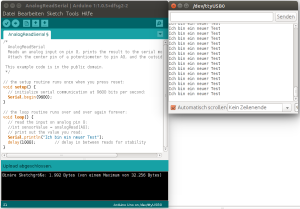USB over IP – First contact point:
- http://usbip.sourceforge.net
- http://raspberrypi.stackexchange.com/questions/4433/how-do-i-make-my-raspberry-pi-act-as-a-wireless-usb-controller
- http://blog.3mdeb.com/2015/10/27/linux/
Actions on the server side – Raspberry Pi
USB over IP is to be available on the Raspberry Pi from kernel Linux 3.17 without further installation.
Check what kernel I have:
17:45:46|pi@raspberrypi:~|$ uname -r 4.1.13+
Kernel version is higher :-)
Test:
17:49:05|pi@raspberrypi:~|$ usbip -bash: usbip: Command not found.
That’s not much good. :-(
Continue with the tips from the forum: https://www.raspberrypi.org/forums/viewtopic.php?p=121691
install usbip
17:49:25|pi@raspberrypi:~|$ sudo apt-get install usbip
loading the Kernel module
17:54:16|pi@raspberrypi:~|$ sudo modprobe usbip-host
Starting the usbip daemon
08:52:50|pi@raspberrypi:~|$ sudo usbipd -D
listing USB devices (without Arduino)
18:01:48|pi@raspberrypi:~|$ lsusb Bus 001 Device 002: ID 0424:9512 Standard Microsystems Corp. Bus 001 Device 001: ID 1d6b:0002 Linux Foundation 2.0 root hub Bus 001 Device 003: ID 0424:ec00 Standard Microsystems Corp.
and listing USB devices (with Arduino plugged in)
18:02:30|pi@raspberrypi:~|$ lsusb Bus 001 Device 002: ID 0424:9512 Standard Microsystems Corp. Bus 001 Device 001: ID 1d6b:0002 Linux Foundation 2.0 root hub Bus 001 Device 003: ID 0424:ec00 Standard Microsystems Corp. Bus 001 Device 005: ID 1a86:7523 QinHeng Electronics HL-340 USB-Serial adapter
In my case is the ID of the USB device: 1a86:7523
The same again with the program usbip
18:05:21|pi@raspberrypi:~|$ sudo usbip list -l Local USB devices ================= - busid 1-1 (0424:9512) 1-1:1.0 -> hub - busid 1-1.1 (0424:ec00) 1-1.1:1.0 -> smsc95xx - busid 1-1.2 (1a86:7523) 1-1.2:1.0 -> ch341
Binding of the USB device
09:22:48|pi@raspberrypi:~/deb_pakete|$ sudo usbip bind -b 1-1.2 bind device on busid 1-1.2: complete
Actions on the client side – in my case a laptop with Ubuntu
Install usbip
Take a look at: https://wiki.ubuntuusers.de/USBIP/
sudo apt-get install linux-tools-generic
loading Kernel module
10:06:22|henry@t410:~/deb_pakete|$ sudo modprobe vhci-hcd 10:08:30|henry@t410:~/deb_pakete|$ lsmod | grep vhci vhci_hcd 33435 0 usbip_core 27617 1 vhci_hcd
Listing the USB devices that are provided on the PI
10:11:10|henry@t410:~/deb_pakete|$ sudo usbip list -r 192.xxx.xxx.xxx Exportable USB devices ====================== - 192.xxx.xxx.xxx 1-1.2: QinHeng Electronics : HL-340 USB-Serial adapter (1a86:7523) : /sys/devices/platform/bcm2708_usb/usb1/1-1/1-1.2 : Vendor Specific Class / unknown subclass / unknown protocol (ff/00/00) : 0 - Vendor Specific Class / unknown subclass / unknown protocol (ff/01/02)
adding the USB Device
10:24:20|henry@t410:~/deb_pakete|$ sudo usbip attach -h 192.xxx.xxx.xxx -b 1-1.2
10:24:45|henry@t410:~/deb_pakete|$ lsusb Bus 003 Device 002: ID 1a86:7523 QinHeng Electronics HL-340 USB-Serial adapter
Check with the Arduino IDE
Actions on the server side – Raspberry Pi
After using on the server side – releasing the USB device
09:22:54|pi@raspberrypi:~/deb_pakete|$ sudo usbip unbind -b 1-1.2 unbind device on busid 1-1.2: complete


